外研(新标准)版七年级下Module 10 A holiday journey知识点讲解课件(41张ppt)
文档属性
| 名称 | 外研(新标准)版七年级下Module 10 A holiday journey知识点讲解课件(41张ppt) |
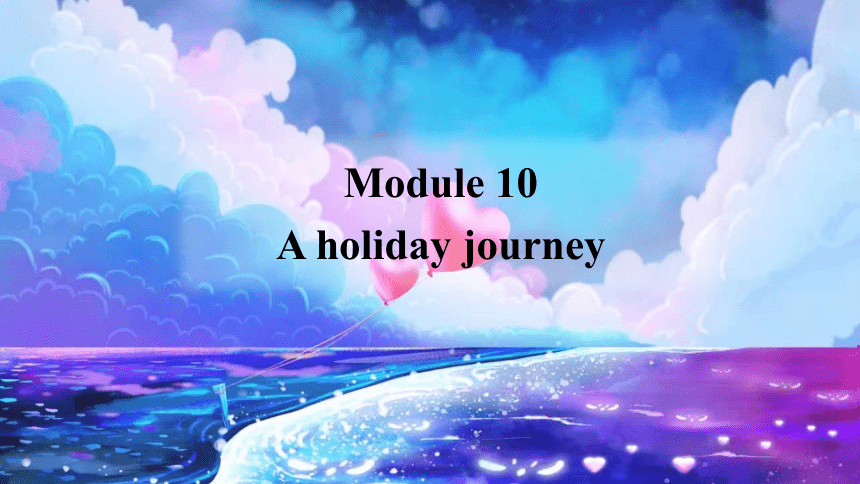
|
|
| 格式 | zip | ||
| 文件大小 | 216.9KB | ||
| 资源类型 | 教案 | ||
| 版本资源 | 外研版 | ||
| 科目 | 英语 | ||
| 更新时间 | 2022-01-16 00:00:00 | ||
图片预览

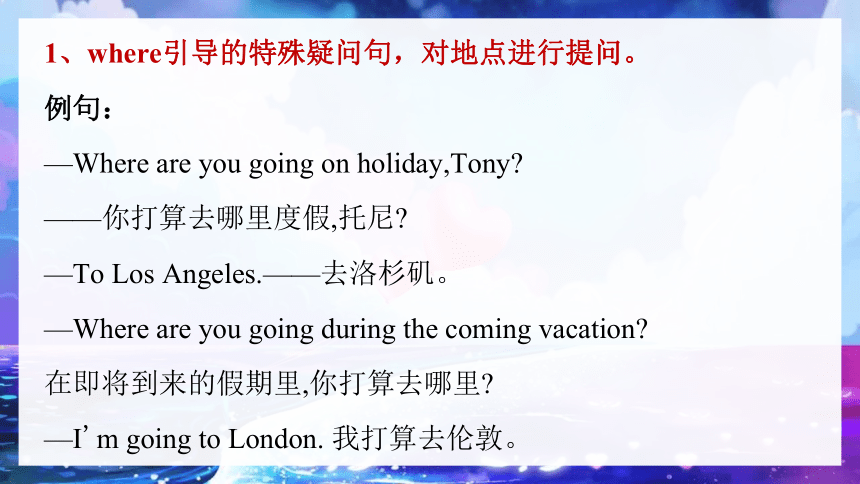

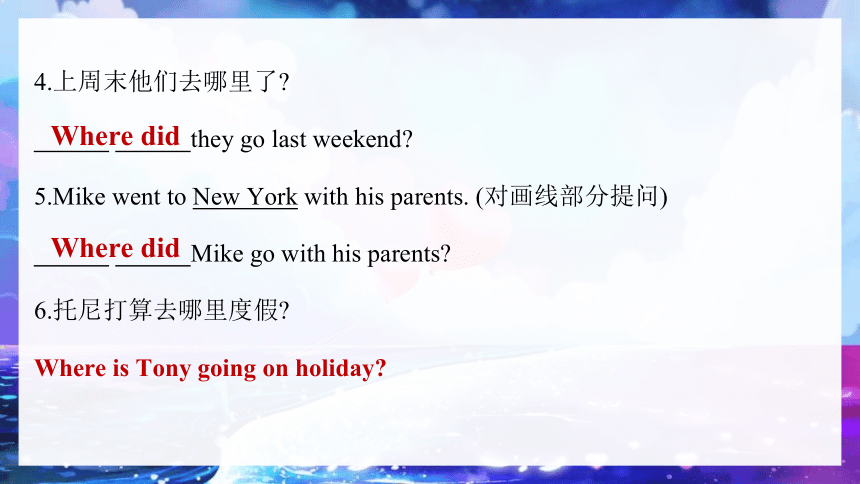
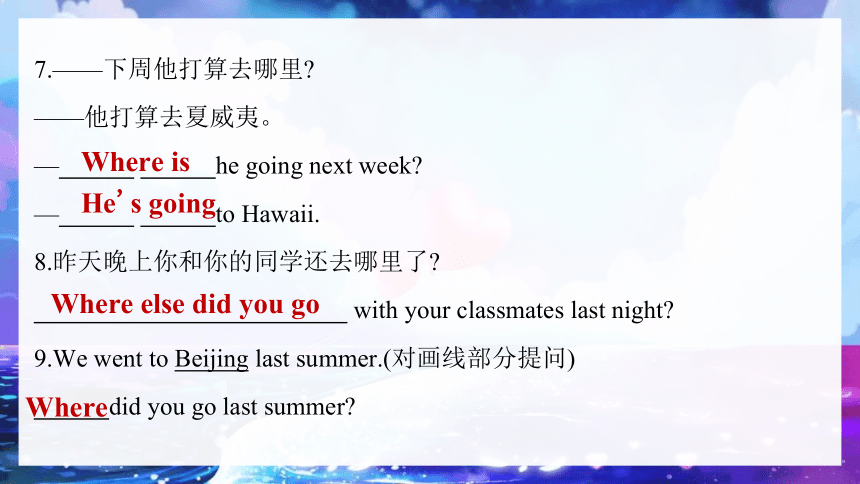
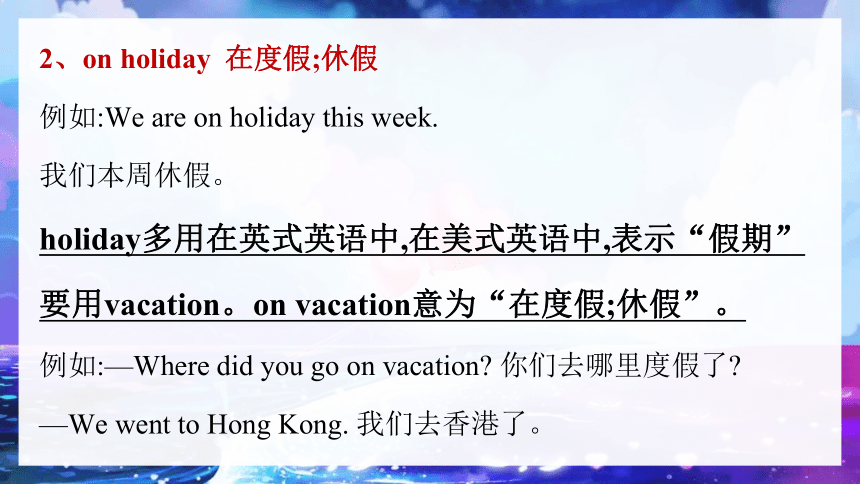
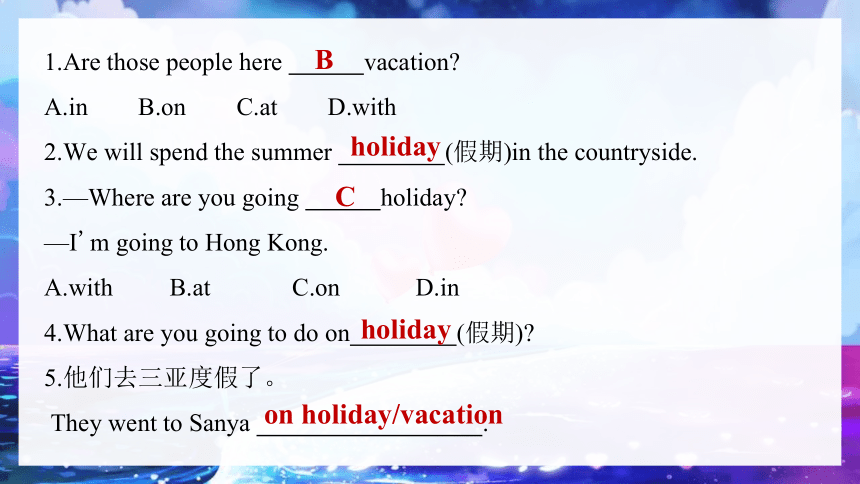
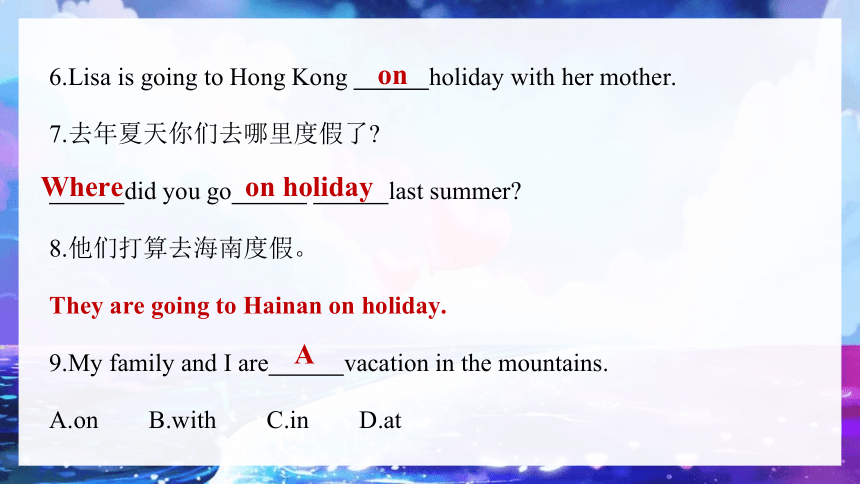
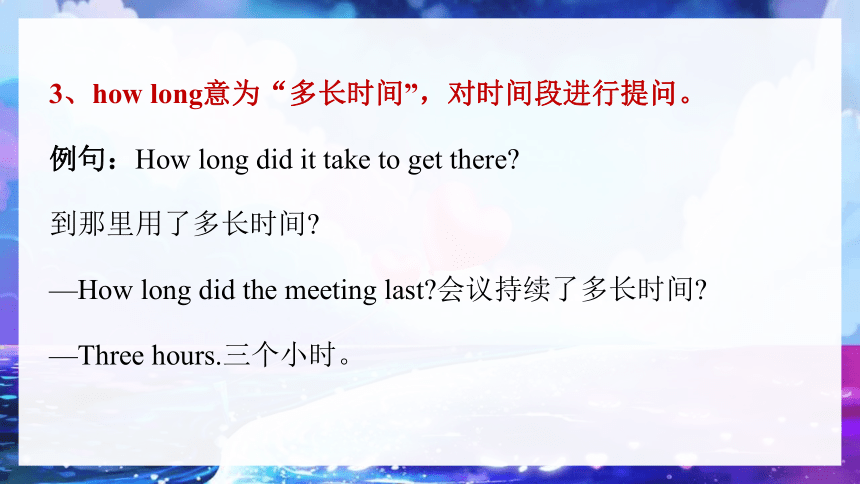
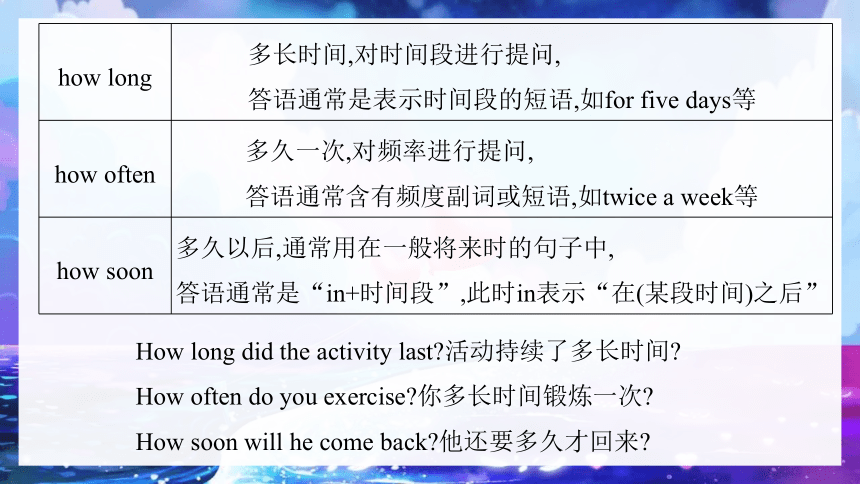
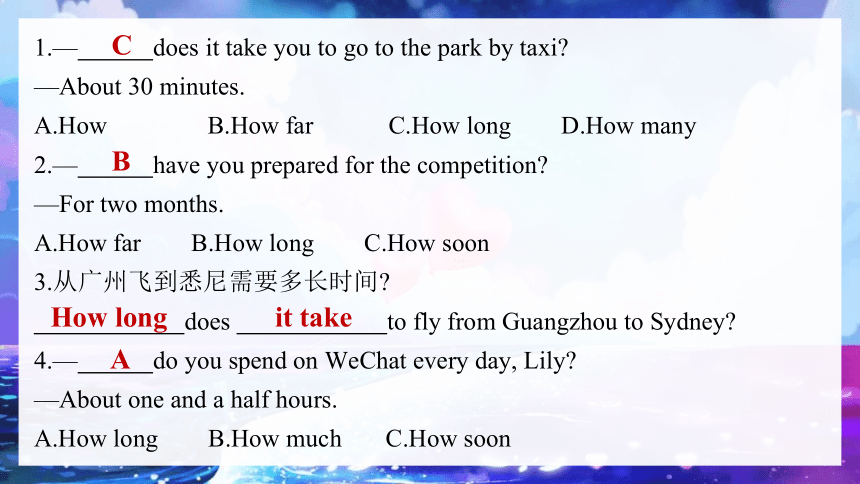
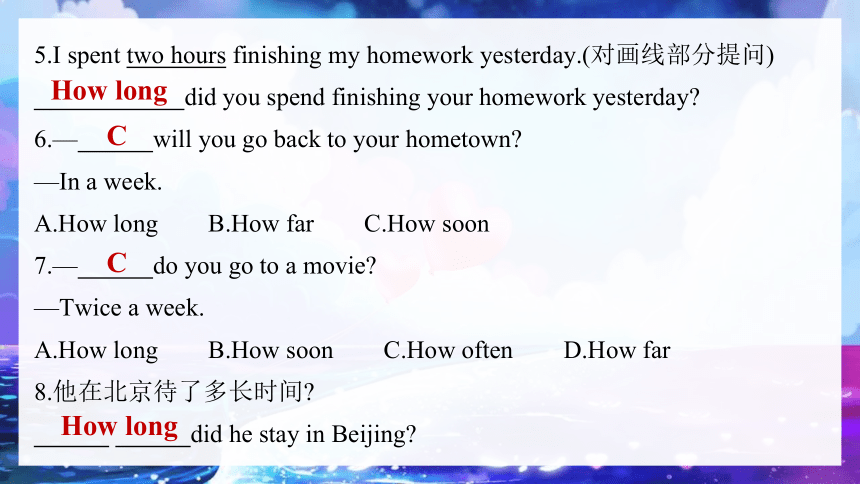
文档简介
(共41张PPT)
Module 10
A holiday journey
1、where引导的特殊疑问句,对地点进行提问。
例句:
—Where are you going on holiday,Tony
——你打算去哪里度假,托尼
—To Los Angeles.——去洛杉矶。
—Where are you going during the coming vacation
在即将到来的假期里,你打算去哪里
—I'm going to London. 我打算去伦敦。
1.— is your aunt going next week
—She is going to New York.
A.What B.Where C.Which D.Who
2.—
—They went to Dali.
A.When did they go to Dali
B.How did they go to Dali
C.Who did they go with
D.Where did they go yesterday
3.— is Jenny from
—She is from the US.
A.Who B.What C.When D.Where
B
D
D
4.上周末他们去哪里了
they go last weekend
5.Mike went to New York with his parents. (对画线部分提问)
Mike go with his parents
6.托尼打算去哪里度假
Where is Tony going on holiday
Where did
Where did
7.——下周他打算去哪里
——他打算去夏威夷。
— he going next week
— to Hawaii.
8.昨天晚上你和你的同学还去哪里了
with your classmates last night
9.We went to Beijing last summer.(对画线部分提问)
did you go last summer
Where is
He's going
Where else did you go
Where
2、on holiday 在度假;休假
例如:We are on holiday this week.
我们本周休假。
holiday多用在英式英语中,在美式英语中,表示“假期”要用vacation。on vacation意为“在度假;休假”。
例如:—Where did you go on vacation 你们去哪里度假了
—We went to Hong Kong. 我们去香港了。
1.Are those people here vacation
A.in B.on C.at D.with
2.We will spend the summer (假期)in the countryside.
3.—Where are you going holiday
—I'm going to Hong Kong.
A.with B.at C.on D.in
4.What are you going to do on (假期)
5.他们去三亚度假了。
They went to Sanya .
B
C
holiday
holiday
on holiday/vacation
6.Lisa is going to Hong Kong holiday with her mother.
7.去年夏天你们去哪里度假了
did you go last summer
8.他们打算去海南度假。
They are going to Hainan on holiday.
9.My family and I are vacation in the mountains.
A.on B.with C.in D.at
A
on
Where on holiday
3、how long意为“多长时间”,对时间段进行提问。
例句:How long did it take to get there
到那里用了多长时间
—How long did the meeting last 会议持续了多长时间
—Three hours.三个小时。
how long 多长时间,对时间段进行提问,
答语通常是表示时间段的短语,如for five days等
how often 多久一次,对频率进行提问,
答语通常含有频度副词或短语,如twice a week等
how soon 多久以后,通常用在一般将来时的句子中,
答语通常是“in+时间段”,此时in表示“在(某段时间)之后”
How long did the activity last 活动持续了多长时间
How often do you exercise 你多长时间锻炼一次
How soon will he come back 他还要多久才回来
1.— does it take you to go to the park by taxi
—About 30 minutes.
A.How B.How far C.How long D.How many
2.— have you prepared for the competition
—For two months.
A.How far B.How long C.How soon
3.从广州飞到悉尼需要多长时间
does to fly from Guangzhou to Sydney
4.— do you spend on WeChat every day, Lily
—About one and a half hours.
A.How long B.How much C.How soon
C
B
A
How long it take
5.I spent two hours finishing my homework yesterday.(对画线部分提问)
did you spend finishing your homework yesterday
6.— will you go back to your hometown
—In a week.
A.How long B.How far C.How soon
7.— do you go to a movie
—Twice a week.
A.How long B.How soon C.How often D.How far
8.他在北京待了多长时间
did he stay in Beijing
C
C
How long
How long
9.— did you spend climbing to the top of the mountain
—About three hours.
A.When B.How C.How long D.How many
10.— can I keep this book
—Two weeks.
A.How soon B.How often C.How long D.How many
11.— do teenagers need to sleep
—At least eight hours a night.
A.How long B.How many C.How often
C
C
A
12.—Sally, I heard you're going to America. will you stay there
—Two whole years.
A.How soon B.How often C.How long
13.My father has been in this company since 1990.(对画线部分提问)
has your father been in this company
14.修理汽车花了你多长时间
How long did it take you to repair the car
15.莉萨在广东省待了多长时间
How long did Lisa stay in Guangdong Province
C
How long
4、excited 激动的;兴奋的,是以-ed结尾的形容词,常用来
修饰人的感受。
例句:I was so excited!我太兴奋了!
We were excited to see the wild animals.
看到那些野生动物,我们很兴奋。
搭配 be excited about...因……而兴奋
拓展 excite v. 使激动;使兴奋
exciting adj. 令人激动的;使人兴奋的(常用来修饰事或物)
1.—Boys and girls, we'll have a three-day holiday next week.
—Great! What news!
A.exciting B.excited C.excite
2.—China has sent Tianzhou 1 into space successfully!
—What (激动人心的) news!
3.They were very (激动的)to see so many animals at the same time.
4.We are about the news that Beijing will hold the Winter
Olympics in 2022.
A.excited;exciting B.exciting;excited C.excited;excite
A
A
exciting
excited
5.—Why are you so (兴奋的)
—I won first place in the match.
6.—The news that Harry and Megan got married was so .
—Yes. Some of the British felt .
A.excited;exciting B.excited;excited
C.exciting;excited D.exciting;exciting
7.This is an story, so I am very .
A.exciting;excited B.exciting;exciting
C.excited;excited D.excited;exciting
A
C
excited
8.—I want to take part in after-class activities.
—So do I. I think these activities can make us feel .
A.relax B.relaxing C.relaxed
9.—Did you watch the first match of the Russian World Cup
—Of course!We were so to watch the match.
A.exciting;excited B.excited;excited
C.exciting;exciting D.excited;exciting
10.We had an (interest)holiday in America last year.
C
D
interesting
5、relax 动词,意为“放松;休息”
例句:
We were tired so we relaxed at home and began our tour of the
city yesterday.
我们都很累,所以我们在家休息,昨天才开始城市之旅。
例如:Classical music makes me relax.
古典音乐令我放松。
We felt relaxed when we listened to classical music.
我们听古典音乐的时候觉得很放松。
What a relaxing afternoon!
一个多么令人放松的下午啊!
relaxing adj.令人放松的 多用来修饰事或物
relaxed adj.放松的 多用来修饰人
1.Playing soccer with my friends after class is (令人放松的).
2.During the next few days, I have decided to have a good rest by taking a walk or seeing a film. I really need to (放松).
3.I am very (relax)when I am walking in the park.
4.—Perhaps one day I may go on a (relax)holiday.
—Yeah, dream on!
relaxing
relax
relaxed
relaxing
5.Every weekend, my sister by playing table tennis with her friend.
A.finishes B.moves C.notices D.relaxes
6.—How do you r (放松)at weekends
—I often listen to music.
7.What a (relax)trip it was!We had a great time.
8.Lisa often (放松)herself by listening to quiet music.
D
relax
relaxing
relaxes
6、sell 动词,意为“卖;出售”。过去式和过去分词是sold。
例句:They sell such good fruit and vegetables.
它们卖这样好的水果和蔬菜。
The farmer went to the market and sold his vegetables.
那个农民去市场上卖他的蔬菜。
反义词:buy v. 购买 I want to buy some fruits.
想买一些水果。
短语:sell out卖完 All the tickets were sold out.
所有的票都卖完了。
1.My father s (卖) his old car and then bought a new one.
2.—Look at my new smartphone.
—Wow, it's so cool! When and where you it
A.do;buy B.have;bought
C.did;buy D.have;had
3.In Switzerland, some of the old clothes are (卖) in charity shops.
C
sold
sold
4.Last year, the light-coloured car (sell) better than the dark-coloured one.
5.My father (buy)a new car the day before yesterday.
6.I'm going to (出售)my old car on the Internet.
7.I bought a T-shirt my mother as a birthday present.
sold
bought
sell
for
7、wait in line 排队等候
例句:
There were lots of tourists, so first of all, we had to wait in line
for an hour, and then we went to the top.
那儿有很多游客,所以我们首先得排队等一个小时,后来我们到了塔顶。
We should wait in line.
我们应该排队等候。
wait的其他短语还有:
wait for等待;等候
can't wait to do sth.迫不及待地……
1.为了买到那种小吃,我排队等候了三个小时。
To buy the snack, I for three hours.
2.你们必须排队等候。
You must .
3.We must wait line. Don't cut in line.
4.每个人都应该排队等候。
Everyone should .
waited in line
wait in line
in
wait in line
8、till/until 连词,意为“直到……为止”
例句:We waited till all the lights were on.
我们一直等到所有的灯都亮了。
We will wait till the rain stops.
我们会一直等到雨停。
用于肯定句中,主句中的谓语动词通常是延续性动词 I lived in that city till/until I was fifteen.
我在那座城市一直住到十五岁。
用于否定句中,主句中的谓语动词通常是非延续性动词(也叫瞬间动词) The boy didn't go to bed till/until his
mother came back.
那个男孩直到他妈妈回来才上床睡觉。
注意 until/till还可以作介词,意为“直到……为止”,此时后跟表示时间的词或短语。
Nothing happened until/till 5 o'clock.
五点钟以前什么事情也没有发生。
1.Tom watched the World Cup 11:30 last night.
A.when B.unless C.until D.as soon as
2.—Jim, let's go out to play basketball.
—Oh, I won't do that I finish my homework.
A.if B.until C.because D.since
3.昨晚我直到我的爸妈回家才睡觉。
Last night I to bed my parents got home.
4.My boss is waiting for the report, so I can't leave here I finish it.
A.since B.until C.though D.if
C
B
B
didn't go till/until
5.We didn't cut the cake Amy made a wish.
A.because B.until C.if
6.—Excuse me. Is it my turn now
—Not yet. Please wait outside your name is called.
A.until B.since C.so
7.我们直到雨停才离开那家餐厅。
We didn't leave the restaurant .
B
A
until the rain stopped
9、get, reach, arrive
get 表“到达”时为不及物动词,
后跟地点名词时要用get to
reach 及物动词,其后可以直接跟地点名词
arrive 不及物动词,可以和介词in、at搭配,
arrive in后跟相对较大的地方,
arrive at后跟相对较小的地方
We got to the airport on time.我们按时到了机场。
When did you reach Beijing 你是什么时候到北京的
She will arrive in London in five days.
她将于5天后到达伦敦。
How did you arrive at the railway station
你是怎样到达火车站的
1.My mother home at six every afternoon.
A.gets to B.arrives at C.gets D.arrives in
2.—Can you (到达)at the railway station on time,Mike
—Yes, I can.
3.—How do they Guangzhou
—They there by plane.
A.get;reach B.arrive at;reach
C.arrive in;get to D.arrive in;get
4.They got the airport on time.
C
D
arrive
to
5.—How does Mr. Green arrive Shanghai
— plane.
A.in;By B.at;By C./;On
6.Mr. Green was surprised to see the police arrive his house.
A.at B.in C.for D.on
7.I'll Beijing on Sunday, the seventh of April.
A.get B.arrive in C.arrive at D.reach in
B
A
A
10、一般过去时(4)
本模块的核心语法是一般过去态中的“特殊
疑问句”,常见的结构是“特殊疑问词/短语+did+主语+动词原形+其他 ”。该结构中常见的特殊疑问词/短语有what、when、where、how、how long等。
特殊疑问词/短语 例句
what —What did you do last night 昨天晚上你们做什么了
—We went to the movies.我们去看电影了。
when —When did you go to Beijing 你什么时候去北京的
—Last week.上星期。
where —Where did you meet Lisa 你是在哪里遇到莉萨的
—I met her in the playground.我是在操场上遇到她的。
how —How did you go to Beijing 你怎么去的北京
—By train.乘火车。
how long —How long did she spend on her homework
她花了多长时间做家庭作业
—Two hours.两个小时。
1.— did your family spend New Year
—In our hometown.
A.Why B.When C.Where D.How
2.谁帮你打扫教室了
you clean the classroom
3.John studied for the test with his classmates last weekend. (对画线部分提问)
did John for the test with his classmates
4.谁和你一起去看演唱会了
Who went to the concert with you
C
Who helped
When study
5.—How does Mr. Green arrive Shanghai
— plane.
A.in;By B.at;By C./;On
6.Mr. Green was surprised to see the police arrive his house.
A.at B.in C.for D.on
7.I'll Beijing on Sunday, the seventh of April.
A.get B.arrive in C.arrive at D.reach in
A
A
B
Module 10
A holiday journey
1、where引导的特殊疑问句,对地点进行提问。
例句:
—Where are you going on holiday,Tony
——你打算去哪里度假,托尼
—To Los Angeles.——去洛杉矶。
—Where are you going during the coming vacation
在即将到来的假期里,你打算去哪里
—I'm going to London. 我打算去伦敦。
1.— is your aunt going next week
—She is going to New York.
A.What B.Where C.Which D.Who
2.—
—They went to Dali.
A.When did they go to Dali
B.How did they go to Dali
C.Who did they go with
D.Where did they go yesterday
3.— is Jenny from
—She is from the US.
A.Who B.What C.When D.Where
B
D
D
4.上周末他们去哪里了
they go last weekend
5.Mike went to New York with his parents. (对画线部分提问)
Mike go with his parents
6.托尼打算去哪里度假
Where is Tony going on holiday
Where did
Where did
7.——下周他打算去哪里
——他打算去夏威夷。
— he going next week
— to Hawaii.
8.昨天晚上你和你的同学还去哪里了
with your classmates last night
9.We went to Beijing last summer.(对画线部分提问)
did you go last summer
Where is
He's going
Where else did you go
Where
2、on holiday 在度假;休假
例如:We are on holiday this week.
我们本周休假。
holiday多用在英式英语中,在美式英语中,表示“假期”要用vacation。on vacation意为“在度假;休假”。
例如:—Where did you go on vacation 你们去哪里度假了
—We went to Hong Kong. 我们去香港了。
1.Are those people here vacation
A.in B.on C.at D.with
2.We will spend the summer (假期)in the countryside.
3.—Where are you going holiday
—I'm going to Hong Kong.
A.with B.at C.on D.in
4.What are you going to do on (假期)
5.他们去三亚度假了。
They went to Sanya .
B
C
holiday
holiday
on holiday/vacation
6.Lisa is going to Hong Kong holiday with her mother.
7.去年夏天你们去哪里度假了
did you go last summer
8.他们打算去海南度假。
They are going to Hainan on holiday.
9.My family and I are vacation in the mountains.
A.on B.with C.in D.at
A
on
Where on holiday
3、how long意为“多长时间”,对时间段进行提问。
例句:How long did it take to get there
到那里用了多长时间
—How long did the meeting last 会议持续了多长时间
—Three hours.三个小时。
how long 多长时间,对时间段进行提问,
答语通常是表示时间段的短语,如for five days等
how often 多久一次,对频率进行提问,
答语通常含有频度副词或短语,如twice a week等
how soon 多久以后,通常用在一般将来时的句子中,
答语通常是“in+时间段”,此时in表示“在(某段时间)之后”
How long did the activity last 活动持续了多长时间
How often do you exercise 你多长时间锻炼一次
How soon will he come back 他还要多久才回来
1.— does it take you to go to the park by taxi
—About 30 minutes.
A.How B.How far C.How long D.How many
2.— have you prepared for the competition
—For two months.
A.How far B.How long C.How soon
3.从广州飞到悉尼需要多长时间
does to fly from Guangzhou to Sydney
4.— do you spend on WeChat every day, Lily
—About one and a half hours.
A.How long B.How much C.How soon
C
B
A
How long it take
5.I spent two hours finishing my homework yesterday.(对画线部分提问)
did you spend finishing your homework yesterday
6.— will you go back to your hometown
—In a week.
A.How long B.How far C.How soon
7.— do you go to a movie
—Twice a week.
A.How long B.How soon C.How often D.How far
8.他在北京待了多长时间
did he stay in Beijing
C
C
How long
How long
9.— did you spend climbing to the top of the mountain
—About three hours.
A.When B.How C.How long D.How many
10.— can I keep this book
—Two weeks.
A.How soon B.How often C.How long D.How many
11.— do teenagers need to sleep
—At least eight hours a night.
A.How long B.How many C.How often
C
C
A
12.—Sally, I heard you're going to America. will you stay there
—Two whole years.
A.How soon B.How often C.How long
13.My father has been in this company since 1990.(对画线部分提问)
has your father been in this company
14.修理汽车花了你多长时间
How long did it take you to repair the car
15.莉萨在广东省待了多长时间
How long did Lisa stay in Guangdong Province
C
How long
4、excited 激动的;兴奋的,是以-ed结尾的形容词,常用来
修饰人的感受。
例句:I was so excited!我太兴奋了!
We were excited to see the wild animals.
看到那些野生动物,我们很兴奋。
搭配 be excited about...因……而兴奋
拓展 excite v. 使激动;使兴奋
exciting adj. 令人激动的;使人兴奋的(常用来修饰事或物)
1.—Boys and girls, we'll have a three-day holiday next week.
—Great! What news!
A.exciting B.excited C.excite
2.—China has sent Tianzhou 1 into space successfully!
—What (激动人心的) news!
3.They were very (激动的)to see so many animals at the same time.
4.We are about the news that Beijing will hold the Winter
Olympics in 2022.
A.excited;exciting B.exciting;excited C.excited;excite
A
A
exciting
excited
5.—Why are you so (兴奋的)
—I won first place in the match.
6.—The news that Harry and Megan got married was so .
—Yes. Some of the British felt .
A.excited;exciting B.excited;excited
C.exciting;excited D.exciting;exciting
7.This is an story, so I am very .
A.exciting;excited B.exciting;exciting
C.excited;excited D.excited;exciting
A
C
excited
8.—I want to take part in after-class activities.
—So do I. I think these activities can make us feel .
A.relax B.relaxing C.relaxed
9.—Did you watch the first match of the Russian World Cup
—Of course!We were so to watch the match.
A.exciting;excited B.excited;excited
C.exciting;exciting D.excited;exciting
10.We had an (interest)holiday in America last year.
C
D
interesting
5、relax 动词,意为“放松;休息”
例句:
We were tired so we relaxed at home and began our tour of the
city yesterday.
我们都很累,所以我们在家休息,昨天才开始城市之旅。
例如:Classical music makes me relax.
古典音乐令我放松。
We felt relaxed when we listened to classical music.
我们听古典音乐的时候觉得很放松。
What a relaxing afternoon!
一个多么令人放松的下午啊!
relaxing adj.令人放松的 多用来修饰事或物
relaxed adj.放松的 多用来修饰人
1.Playing soccer with my friends after class is (令人放松的).
2.During the next few days, I have decided to have a good rest by taking a walk or seeing a film. I really need to (放松).
3.I am very (relax)when I am walking in the park.
4.—Perhaps one day I may go on a (relax)holiday.
—Yeah, dream on!
relaxing
relax
relaxed
relaxing
5.Every weekend, my sister by playing table tennis with her friend.
A.finishes B.moves C.notices D.relaxes
6.—How do you r (放松)at weekends
—I often listen to music.
7.What a (relax)trip it was!We had a great time.
8.Lisa often (放松)herself by listening to quiet music.
D
relax
relaxing
relaxes
6、sell 动词,意为“卖;出售”。过去式和过去分词是sold。
例句:They sell such good fruit and vegetables.
它们卖这样好的水果和蔬菜。
The farmer went to the market and sold his vegetables.
那个农民去市场上卖他的蔬菜。
反义词:buy v. 购买 I want to buy some fruits.
想买一些水果。
短语:sell out卖完 All the tickets were sold out.
所有的票都卖完了。
1.My father s (卖) his old car and then bought a new one.
2.—Look at my new smartphone.
—Wow, it's so cool! When and where you it
A.do;buy B.have;bought
C.did;buy D.have;had
3.In Switzerland, some of the old clothes are (卖) in charity shops.
C
sold
sold
4.Last year, the light-coloured car (sell) better than the dark-coloured one.
5.My father (buy)a new car the day before yesterday.
6.I'm going to (出售)my old car on the Internet.
7.I bought a T-shirt my mother as a birthday present.
sold
bought
sell
for
7、wait in line 排队等候
例句:
There were lots of tourists, so first of all, we had to wait in line
for an hour, and then we went to the top.
那儿有很多游客,所以我们首先得排队等一个小时,后来我们到了塔顶。
We should wait in line.
我们应该排队等候。
wait的其他短语还有:
wait for等待;等候
can't wait to do sth.迫不及待地……
1.为了买到那种小吃,我排队等候了三个小时。
To buy the snack, I for three hours.
2.你们必须排队等候。
You must .
3.We must wait line. Don't cut in line.
4.每个人都应该排队等候。
Everyone should .
waited in line
wait in line
in
wait in line
8、till/until 连词,意为“直到……为止”
例句:We waited till all the lights were on.
我们一直等到所有的灯都亮了。
We will wait till the rain stops.
我们会一直等到雨停。
用于肯定句中,主句中的谓语动词通常是延续性动词 I lived in that city till/until I was fifteen.
我在那座城市一直住到十五岁。
用于否定句中,主句中的谓语动词通常是非延续性动词(也叫瞬间动词) The boy didn't go to bed till/until his
mother came back.
那个男孩直到他妈妈回来才上床睡觉。
注意 until/till还可以作介词,意为“直到……为止”,此时后跟表示时间的词或短语。
Nothing happened until/till 5 o'clock.
五点钟以前什么事情也没有发生。
1.Tom watched the World Cup 11:30 last night.
A.when B.unless C.until D.as soon as
2.—Jim, let's go out to play basketball.
—Oh, I won't do that I finish my homework.
A.if B.until C.because D.since
3.昨晚我直到我的爸妈回家才睡觉。
Last night I to bed my parents got home.
4.My boss is waiting for the report, so I can't leave here I finish it.
A.since B.until C.though D.if
C
B
B
didn't go till/until
5.We didn't cut the cake Amy made a wish.
A.because B.until C.if
6.—Excuse me. Is it my turn now
—Not yet. Please wait outside your name is called.
A.until B.since C.so
7.我们直到雨停才离开那家餐厅。
We didn't leave the restaurant .
B
A
until the rain stopped
9、get, reach, arrive
get 表“到达”时为不及物动词,
后跟地点名词时要用get to
reach 及物动词,其后可以直接跟地点名词
arrive 不及物动词,可以和介词in、at搭配,
arrive in后跟相对较大的地方,
arrive at后跟相对较小的地方
We got to the airport on time.我们按时到了机场。
When did you reach Beijing 你是什么时候到北京的
She will arrive in London in five days.
她将于5天后到达伦敦。
How did you arrive at the railway station
你是怎样到达火车站的
1.My mother home at six every afternoon.
A.gets to B.arrives at C.gets D.arrives in
2.—Can you (到达)at the railway station on time,Mike
—Yes, I can.
3.—How do they Guangzhou
—They there by plane.
A.get;reach B.arrive at;reach
C.arrive in;get to D.arrive in;get
4.They got the airport on time.
C
D
arrive
to
5.—How does Mr. Green arrive Shanghai
— plane.
A.in;By B.at;By C./;On
6.Mr. Green was surprised to see the police arrive his house.
A.at B.in C.for D.on
7.I'll Beijing on Sunday, the seventh of April.
A.get B.arrive in C.arrive at D.reach in
B
A
A
10、一般过去时(4)
本模块的核心语法是一般过去态中的“特殊
疑问句”,常见的结构是“特殊疑问词/短语+did+主语+动词原形+其他 ”。该结构中常见的特殊疑问词/短语有what、when、where、how、how long等。
特殊疑问词/短语 例句
what —What did you do last night 昨天晚上你们做什么了
—We went to the movies.我们去看电影了。
when —When did you go to Beijing 你什么时候去北京的
—Last week.上星期。
where —Where did you meet Lisa 你是在哪里遇到莉萨的
—I met her in the playground.我是在操场上遇到她的。
how —How did you go to Beijing 你怎么去的北京
—By train.乘火车。
how long —How long did she spend on her homework
她花了多长时间做家庭作业
—Two hours.两个小时。
1.— did your family spend New Year
—In our hometown.
A.Why B.When C.Where D.How
2.谁帮你打扫教室了
you clean the classroom
3.John studied for the test with his classmates last weekend. (对画线部分提问)
did John for the test with his classmates
4.谁和你一起去看演唱会了
Who went to the concert with you
C
Who helped
When study
5.—How does Mr. Green arrive Shanghai
— plane.
A.in;By B.at;By C./;On
6.Mr. Green was surprised to see the police arrive his house.
A.at B.in C.for D.on
7.I'll Beijing on Sunday, the seventh of April.
A.get B.arrive in C.arrive at D.reach in
A
A
B
同课章节目录
- Module 1 Lost and found
- Unit 1 Whose bag is this?
- Unit 2 Are they yours?
- Unit 3 Language in use
- Module 2 What can you do ?
- Unit 1 I can play the piano
- Unit 2 I can run really fast
- Unit 3 Language in use
- Module 3 Making plans
- Unit 1 What are you going to do at the weekends?
- Unit 2 We're going to cheer the players.
- Unit 3 Language in use
- Module 4 Life in the future
- Unit 1 Everyone will study at home
- Unit 2 Every family will have a small plane.
- Unit 3 Language in use
- Module 5 Shopping
- Unit 1 What can I do for you?
- Unit 2 You can buy everything on the Internet
- Unit 3 Language in use
- Module 6 Around town
- Unit 1 Could you tell me how to get to the Nationa
- Unit 2 The London Eye is on your right.
- Unit 3 Language in use
- Revision module A
- Module 7 My past life
- Unit 1 I was born in a small village.
- Unit 2 I was born in Quincy.
- Unit 3 Language in use
- Module 8 Story time
- Unit 1 Once upon a time….
- Unit 2 Goldilocks hurried out of the house.
- Unit 3 Language in use
- Module 9 Life history
- Unit 1 He left school and began work at the age of
- Unit 2 He decided to be an actor.
- Unit 3 Language in use
- Module 10 A holiday journey
- Unit 1 What did you do?
- Unit 2 This morning we took a walk.
- Unit 3 Language in use
- Module 11 Body language
- Unit 1 They touch noses!
- Unit 2 Here are some ways to welcome them.
- Unit 3 Language in use
- Module 12 Western music
- Unit 1 It's so beautiful!
- Unit 2 Vienna is the centre of European classical
- Unit 3 Language in use
- Revision module B
